|
Whether you have just begun to learn Gaelic or have been learning for a while, you will have noticed that the Gaelic alphabet works quite differently to the English (or almost any other) alphabet. I like to think of the letters as people with their own personalities. Once you get to know them you can predict how they are going to behave in different situations. So with that in mind let me introduce you to a few interesting people: TThe letter T has a strong personality, you might even say stubborn. It wants its voice heard so it will resist lenition where possible. When it does lenite it makes an 'H' sound.
It likes to hang out with its best friend D. They are good friends and make sounds that are closer to each other than the English sounds. When it gets around the slender vowels it makes a 'ch' sound.
1 Comment
One of the best way to go from a Gaelic learner to a Gaelic speaker is to use Gaelic in your everyday life. With yoga becoming very popular all over the world, it can be a great way to use Gaelic as well as being good for your health. Here are Gaelic names for 5 easy yoga poses. Cù Sìos: downward dogBeinn: mountaincraobh: treeLaoch a dhà: warrior 2dannsair: dancerfaireachdainn (f) = emotions, feeling / émotion, sentiment
faireachdainnean (pl) = emotions, feelings / émotions, sentiments Tha mi toilichte = I am happy / Je suis heureux Tha mi brònach = I am sad / Je suis triste Tha an t-eagal orm = I am scared / J'ai peur Tha mi feargach = I am angry / Je suis en colère to go further... pour aller plus loin... Tha mi moiteil (à/às) = I am proud (of) / Je suis fier (de) Tha mi air mo dhòigh = I am pleased / Je suis ravi Tha mi claoidhte = I am exhausted / Je suis exténué Tha mi fo spàirn = I am stressed / Je suis stressé Tha iongnadh orm = I am surprised / Je suis surpris Tha mi air bhioran = I am excited / Je suis surexcité, enthousiaste Tha mi coma = I don't care / Ça m'est égal Tha mi nam ghlòraidh = I am in my element / Je suis dans mon élément Agus ciamar a tha thu fhèin a' faireachdainn an-dràsta? an cur seachad (m) = the hobby / le hobby
na cur-seachadan = the hobbies / les hobbies A bheil cur-seachad agad? = Do you have a hobby? / Est-ce que tu as un hobby? Dè na cur-seachadan a th' agad? = What are your hobbies? / Quels sont tes hobbies? Bidh mi a' leughadh = I read / Je lis Bidh mi a' fighe = I knit / Je tricote Bidh mi ag èiteachd ri ceòl = I listen to music / J'écoute de la musique Bidh mi ag ionnsachadh Gàidhlig = I learn Gaelic / J'apprends le gaélique Bidh mi a' rothaireachd = I cycle / Je fais du vélo Bidh mi a' snàmh = I swim / Je nage Bidh mi a' coimhead air an TBh = I watch TV / Je regarde la TV Bidh mi a' peantadh = I paint / Je peins Bidh mi a' seinn = I sing / Je chante Bidh mi a' cluich ball-coise = I play football / Je joue au football Bidh mi a' cluich giotàr = I play the guitar / Je joue de la guitare Bidh mi a' gàrradaireachd = I garden / Je jardine Gach latha = every day / chaque jour Gach seachdain = every week / chaque semaine Gach Diluain = every Monday / tous les lundis Gu tric = often / souvent Did you notice that to talk about hobbies, we used "Bidh" the future tense of "tha" (verb to be)? It is because in Gaelic, the future tense is also used to talk about habbits or things that one does regularly. Compare these sentences: As-tu remarqué que pour parler des hobbies, nous avons utilisé "Bidh" le futur de "tha" (verbe être)? C'est parce qu'en gaélique, le futur est aussi utilisé pour parler des habitudes, des choses que l'on fait régulièrement. Compare ces phrases:
Agus dè na cur-seachadan a th' agad fhèin? Am baile = la ville
An t-ospadal = l’hôpital An taigh-tasgaidh = le musée An taigh-òsta = l’hôtel An taigh-dhealbh = le cinema An taigh-bìdh = le restaurant An cafaidh = le café Am banca = la banque An oifis a’ phuist = la poste An eaglais = l’église An sgoil = l’école An stèisean = la station, la gare A’ bhùth = le magasin Tha mi a’ fuireach ann am meadhan a’ bhaile. = J’habite au centre-ville. A bheil an oifis a’ phuist fosgailte ? = La poste est-elle ouverte ? Tha am banca dùinte. = La banque est fermée. Càite a bheil an stèisean ? = Où est la gare/la station ? Tha mi a’ dol dhan bhùth. = Je vais au magasin. Tha e anns an ospadal. = Il est à l’hôpital. An seòmar-ithe / an seòmar-bìdh (m) = la salle à manger
an fhorc (f) = la fourchette an sgian (f) = le couteau an spàin (f) = la cuillère an truinnsear (m) = l’assiette a’ ghlainne (f) = le verre an cupa (m) = la tasse ith !, ag ithe = manger òl !, ag òl = boire am biadh (m) = la nourriture Tha mi anns an t-seòmar-bìdh = Je suis dans la salle à manger ’S toigh leam a bhith ag ithe biadh Eadailteach = j’aime manger italien Cuir na truinnsearan air a’ bhòrd ! = Pose les assiettes sur la table ! Dè tha thu ag ithe ? = Qu’est-ce que tu es en train de manger ? an cidsin (m) = la cuisine
am bòrd (m) = la table an sèithear (m) = la chaise an àmhainn (f) = le four an cucar (m) = la cuisinière an t-sinc (f) = l’évier am frids / am fuaradair (m) = le réfrigérateur na soithichean (pl) = la vaisselle am pana (m) = la casserole am praigheapan (m) = la poêle anns a’ chidsin = dans la cuisine còcairich ! , a’ còcaireachd = cuisiner ’S toigh leam a bhith a’ còcaireachd = J’aime cuisiner Tha a’ chèic anns an àmhainn = Le gâteau est dans le four Tha mi a’ nighe nan soithichean = je fais la vaisselle
an seòmar-cadail (m) = la chamber à coucher
an leabaidh (f) = le lit a’ chluasag (f) = l’oreiller an lampa (m) = la lampe am preas-aodaich (m) = l’armoire (pour les vêtements) am bòrd-leapa (m) = la table de nuit cadail !, a’ cadal = dormir anns an t-seòmar-cadail = dans la chambre à coucher Tha mi anns an t-seòmar-cadail = je suis dans la chambre à coucher Tha mi a’ dol dhan t-seòmar-cadail = je vais dans la chambre à coucher oidhche mhath ! = bonne nuit !
An taigh (m) = la maison
Am flat (m) = l’appartement Dachaigh (f) = chez-soi, foyer Am mullach (m) = le toit An làr (m) = le sol An doras (m) = la porte An uinneag (f) = la fenêtre An seòmar (m) = la pièce, la chambre An àirneis (f) = le mobilier An staidhre (f) = les escaliers Tha mi a’ fuireach ann an taigh = j’habite dans une maison Tha mi a’ fuireach ann am flat = j’habite dans un appartement Tha mi a’ dol dhachaigh = je vais à la maison / chez moi Seo mo dhachaigh = voici mon chez-moi Thig a-steach ! = Entre ! Thigibh a-steach ! = Entrez !
Here are some helpful words around the house:
am bòrd. the table. This word is masculine so if you want to use an adjective it will look like this: am bòrd gorm. The blue table. a' chathair. the chair This word is feminine so if you want to use an adjective it will look like this: a' chathair phinc. The pink chair. an doras. the door. This word is masculine so if you want to use an adjective it will look like this: An doras geal. the white door. an leabaidh. This word is feminine so if you want to use an adjective it will look like this: an leabaidh bhog. the soft bed. an uinneag. the window This word is feminine so if you want to use an adjective it will look like this: an uinneag bheag. the small window. |
Details
AuthorsCaroline has been involved with Gaelic for more than 18 years. She has degrees in Celtic Studies and Gaelic Medium Teaching. Archives
March 2021
Categories
All
|
Proudly powered by Weebly

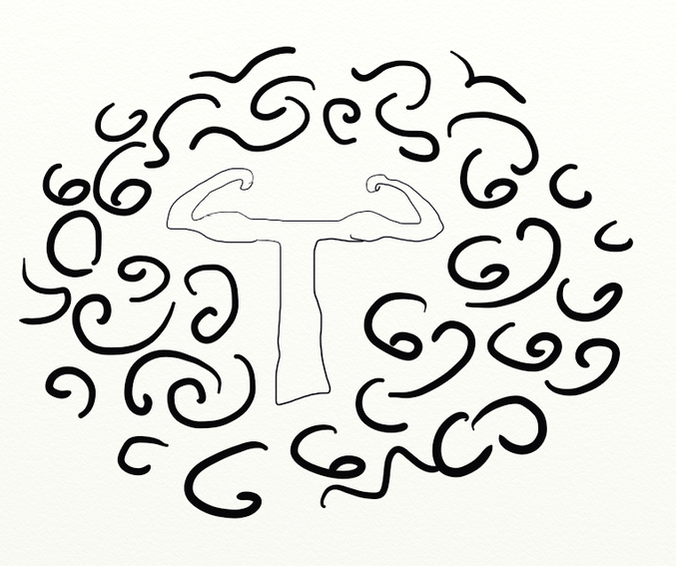
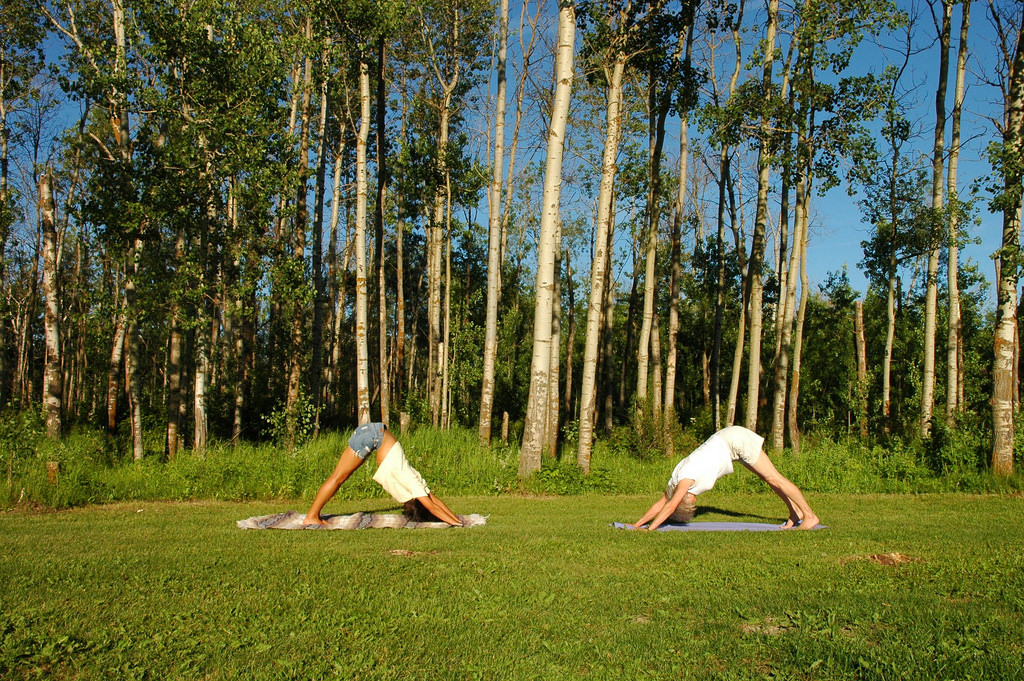
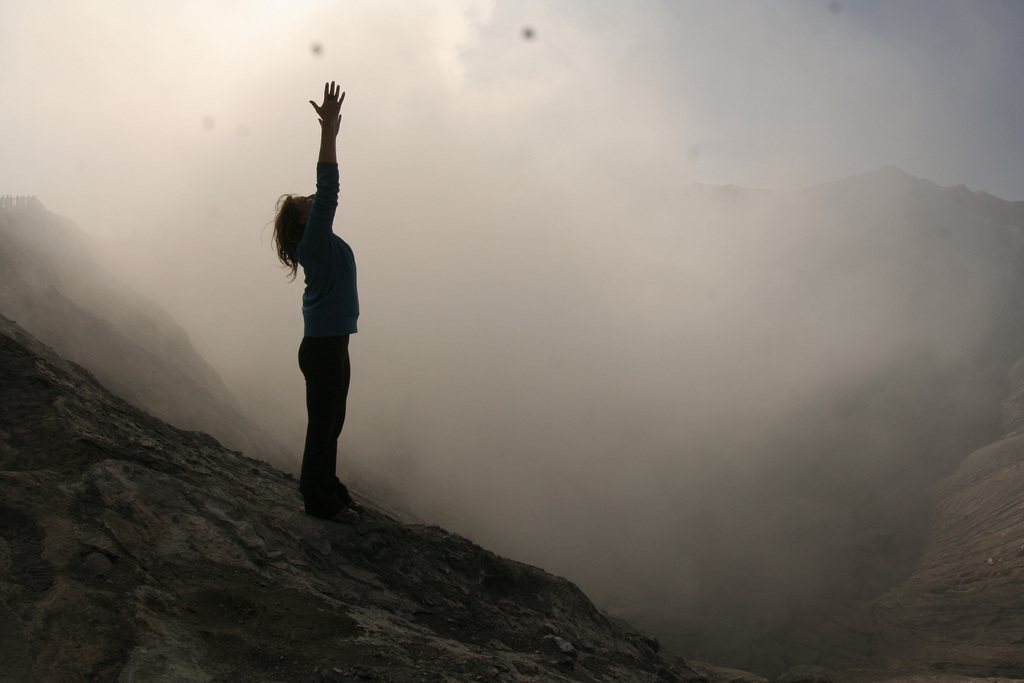
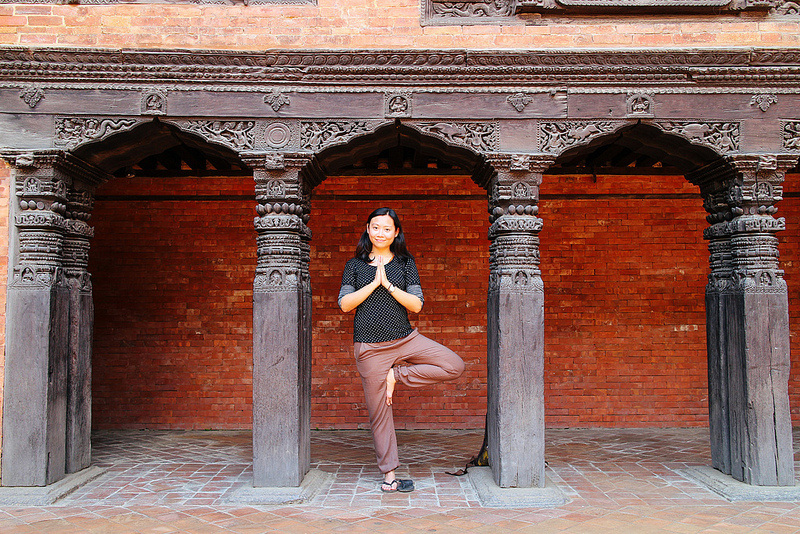
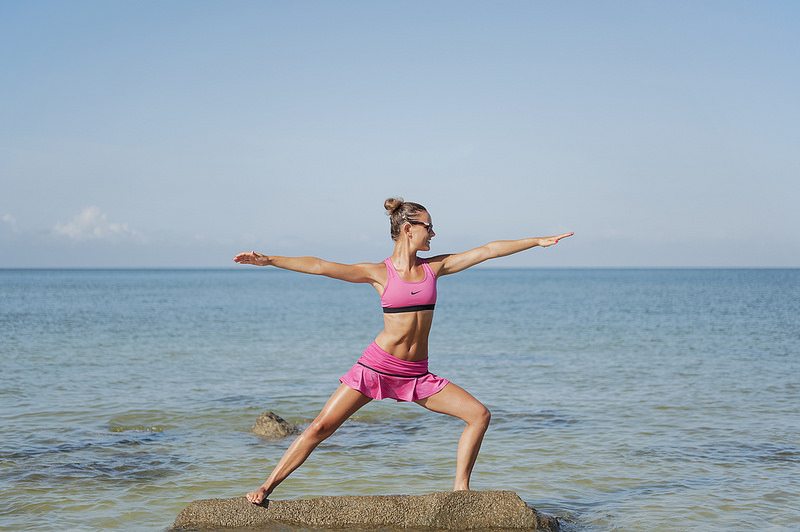
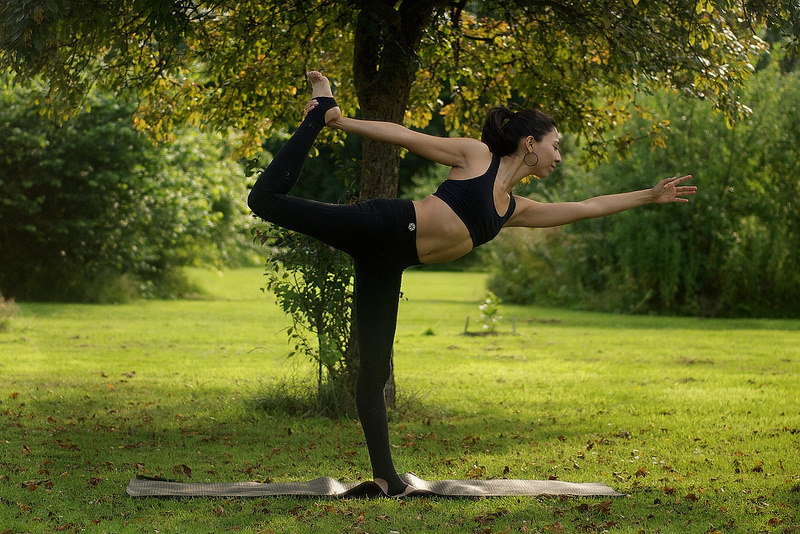
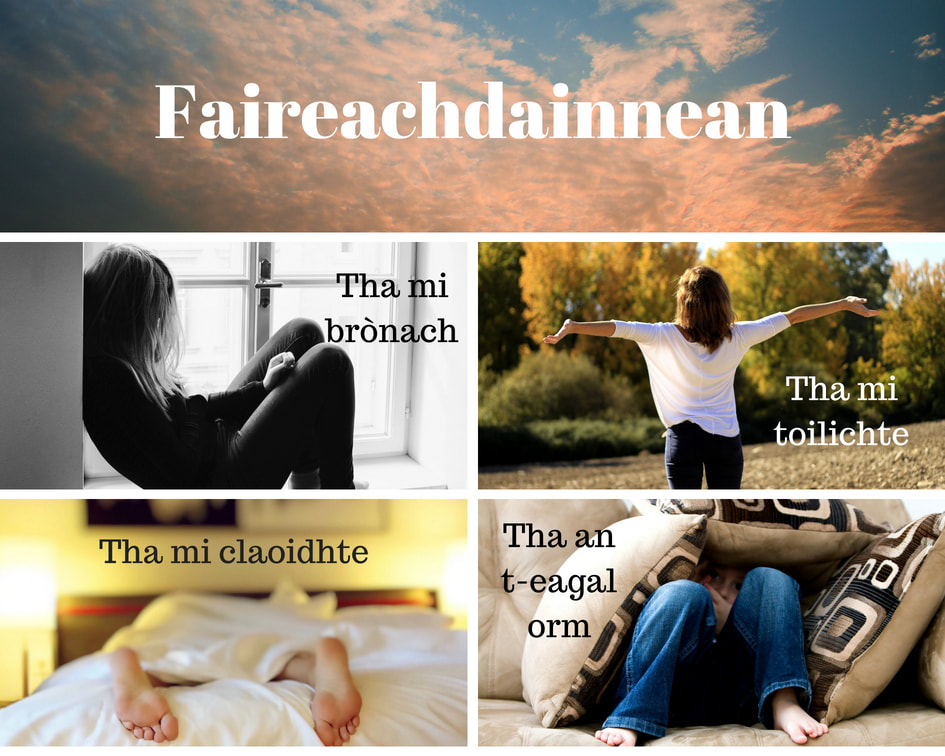
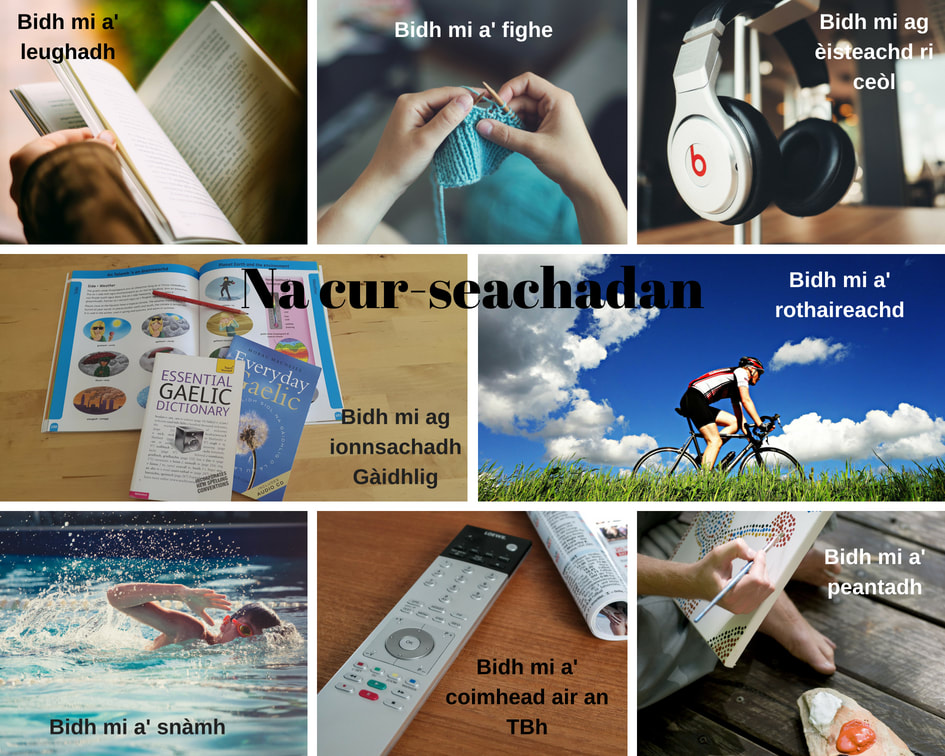
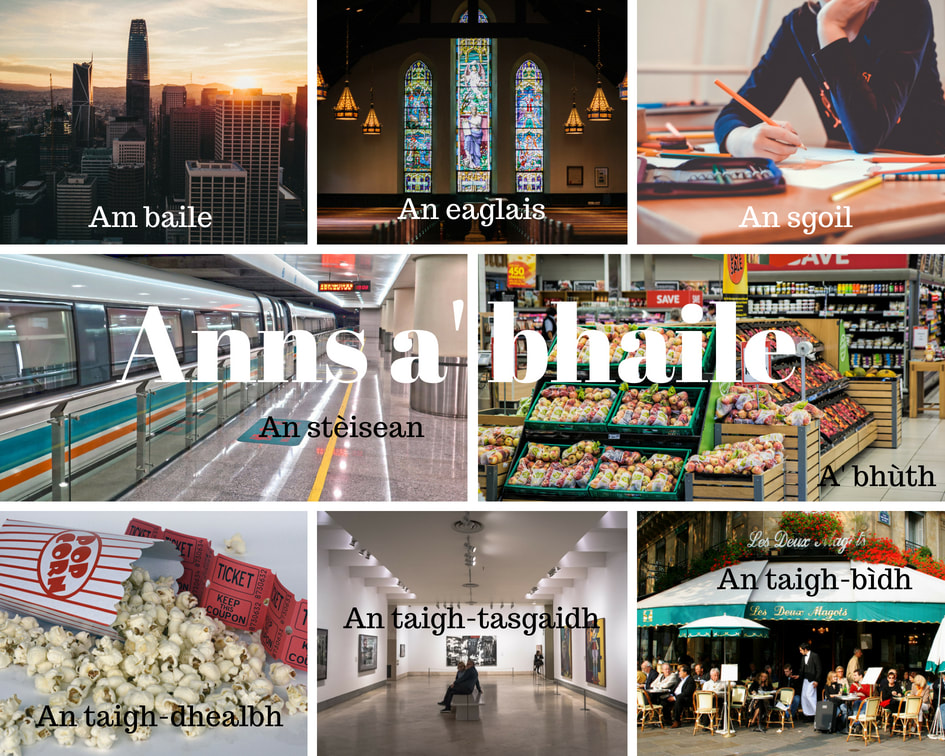
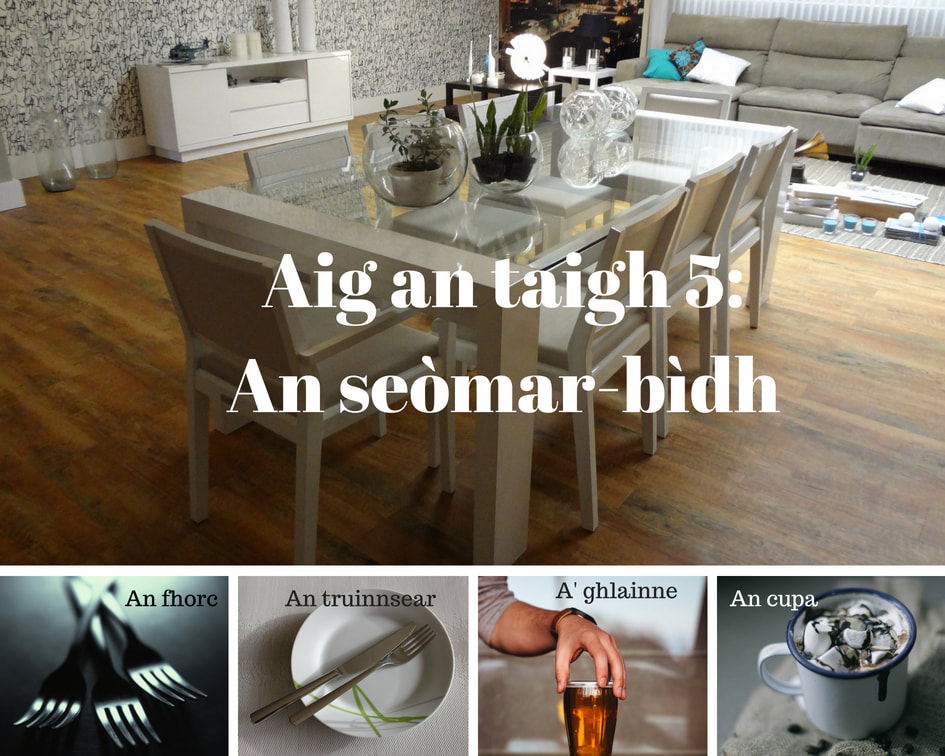
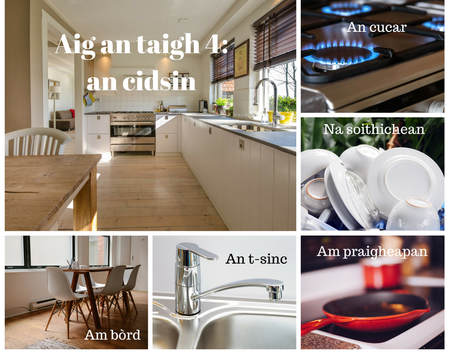
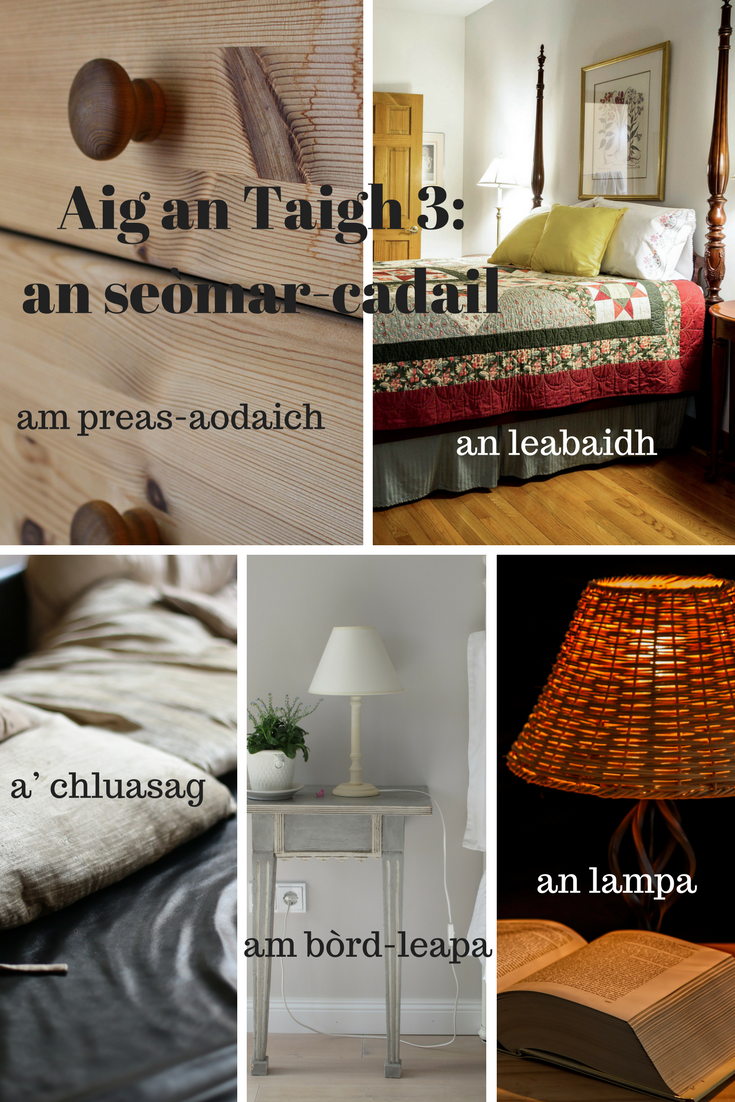
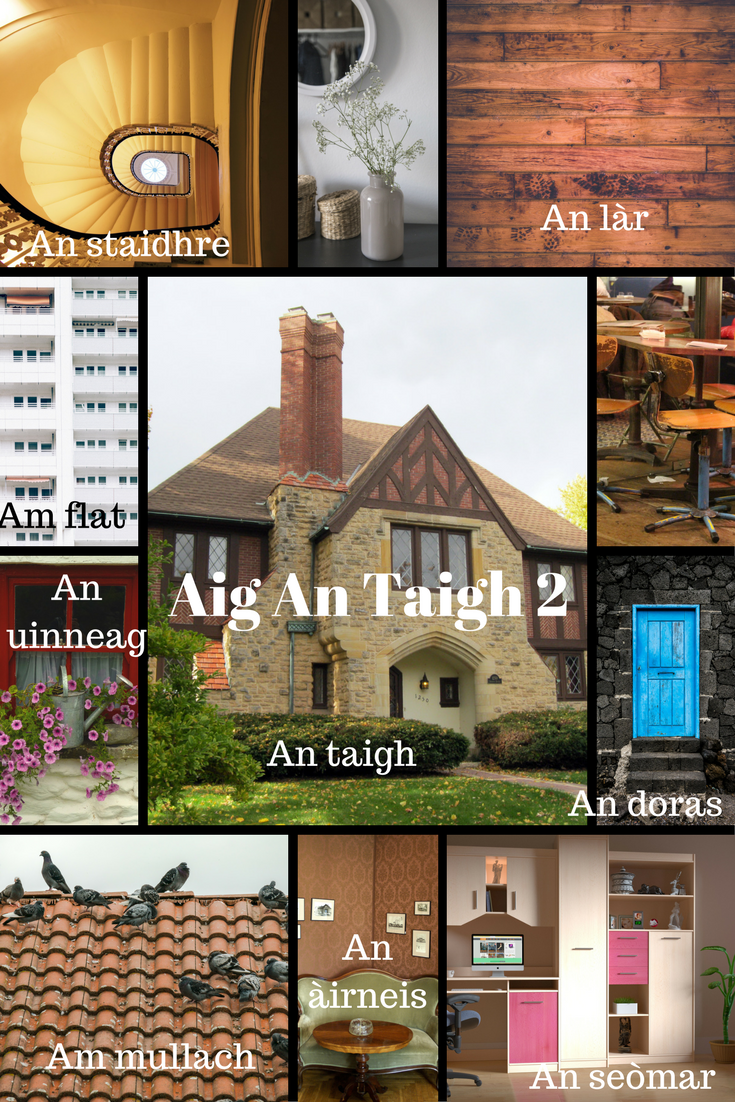
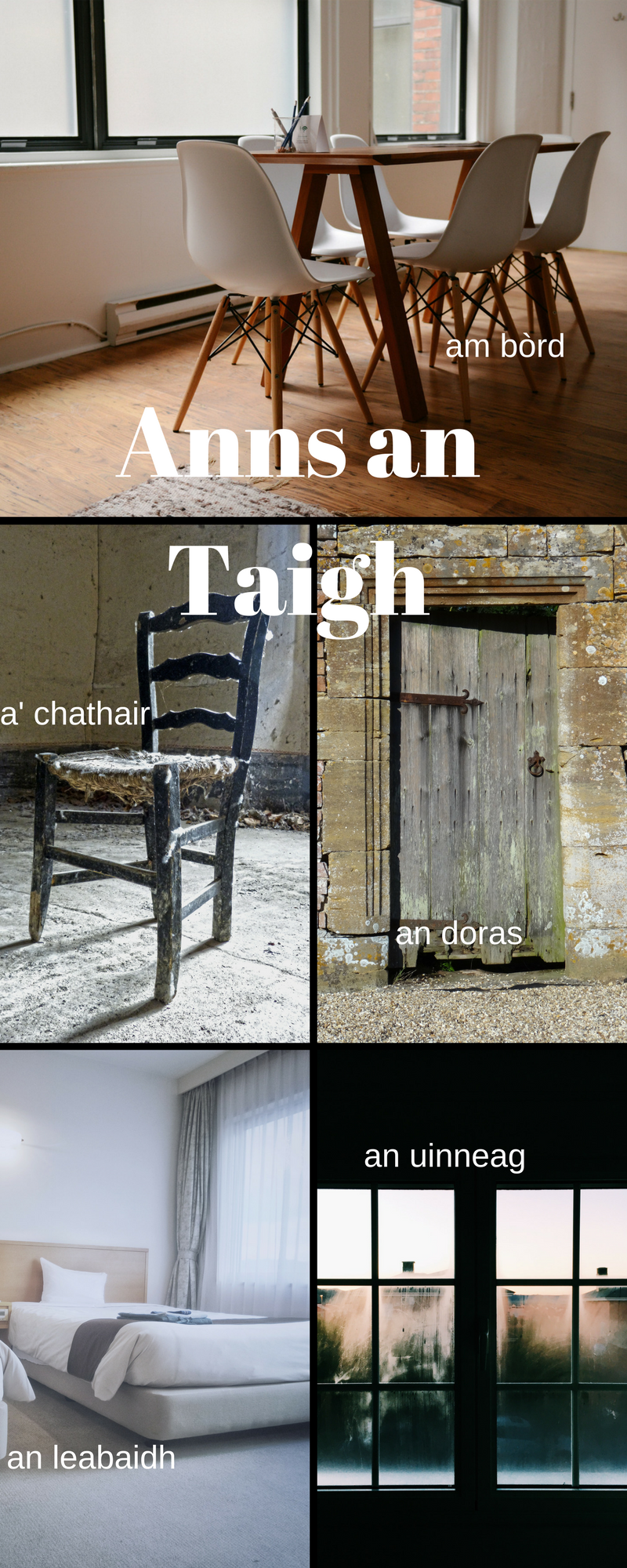
 RSS Feed
RSS Feed